- Home
- M G Vassanji
When She Was Queen
When She Was Queen Read online
Also by MG Vassanji
The In-Between World of Vikram Lall
Amrüka
The Book of Secrets
No New Land
Uhuru Street
The Gunny Sack
For Harish and Alka
Contents
When She Was Queen
The Girl on the Bicycle
The Sky to Stop Us
The Expected One
Her Two Husbands
Last Rites
Is It Still October
Elvis, Raja
The Trouble with Tea
Dear Khatija
She, with Bill and George
Farida
When She Was Queen
My father lost my mother one evening in a final round of gambling at the poker table. I have often tried to recall that moment, its exact details of scene and mood, though I was not present there, could not have been. I was, if you will, the contingent phenomenon, a potential lurking in the unholy fug of a revelrous night spun out of control. My father’s gesture was not the nail-biting one of a compulsive gambler who, having lost all, imagines with diseased mind he will redeem himself with just that one hand that Lady Luck, his kismet, was bound to throw his way. Nor was there an epic dimension to that fateful moment—ancient enemy seeking ultimate revenge—castration in public. My father was unusual in many ways; but he was also a simple innkeeper, who succumbed in an instant to one gigantic temptation. He had already won a few hundred shillings that night, not a trifling sum for him. But then, in all the whimsical naivety of his nature he let his good sense abandon him. He saw a miraculous vision of more, he desired it to distraction. On the table for him to win was a palatial lakeside residence, which turned Mother heartbreakingly wistful and envious every time she set her eyes on it, and which he could never hope to provide her in a hundred years with his wages. When John Chacha, known otherwise as the Asian King of Kisumu, declared magnanimously, “I am ready to bid what is dearest to me, this alishaan mansion—there, you have a chance to wipe me out and move in with your lovely wife into my castle—” Father said, “Don’t I only wish I had something of value to match your bid.”
John Chacha, with his impressive, oversized head and abundant white mane, beamed at my father across the table.
“You have,” he said. “You have exactly such a thing.”
The few people standing around the table followed the big man’s wolfish leer and smiled in nervous anticipation. And my fair and beautiful mother, with her stylishly modern, short brown hair and shimmering olive-green sari, on whom that eye fell as she stood watching behind her red-faced husband: Why did she choose to remain silent?
I have gleaned this story from whatever my mother Shirin, and my two elder sisters Razia and Habibeh, who were then seven and nine years old, have relinquished to my queries. We all live in Toronto now, far from Kisumu by Lake Victoria, and my father Rashid has been dead twenty years. Let us say that over the years enough allusion to that eventful night had flown past me, uncomprehended, that finally I decided to uncover all the mystery surrounding it.
In the mid-1960s my family were settled in Kisumu, down from the western ridge of the Great Rift Valley, in the cosy equatorial embrace of the Lake Victoria shoreline. It was soon after the independence of Kenya, life in this new sunshine was freer and livelier than it had ever been before; the Indians were emerging from the former mingy, scrappy existence of their neighbourhoods. There was money around, and there was life to be lived. I recall a happy childhood from those days, and legends about the hardships and migrations of a distant past. My father Rashid, who had tried his hand as a salesman at a hunting store in Nairobi, as a safari rally driver and navigator, and as manager of a timber mill and later a tea plantation, had been enticed when the plantation was sold by its owners to manage one Rose Hotel in Kisumu. Rashid Jafar was an outsider in Kisumu, but because of having worked with Europeans and acquired certain mannerisms and habits as a result, and due to his brush with glory when he and his co-driver came close to beating the Swedish aces Erikson and Erikson in the East African Safari rally (their Peugeot 404 overturned on the home stretch outside Nairobi), he was welcomed by the rich Asians of that town.
Every Friday night a certain rambunctious group among this elite would meet at the Rose Hotel for a late dinner from its renowned menu. The kitchen at the Rose was famous from Nairobi to Kampala for its rich spicy dishes—the chicken tikka, the lamb biryani, the coconut and coriander fish, and the naans and parathas; tourist handbooks raved about its tantalizing aromas and rich tastes, and airline pilots were known to hitch rides with each other to eat there. This glory of the Rose was a creation of my father.
He would say his hero was the famous explorer Henry Morton Stanley—whose name was more apt to draw scorn and contempt in independent East Africa for his reputed cruelty, but what Rashid admired about that American was his pure gumption, the fact that he, a foreigner, simply arrived on the scene one day and started up the Congo River on foot and on boat and wound up ultimately not far from our town in the heart of the continent. Rashid’s spirit was not of the outdoors type, but he too was a mover, a migrant. Kisumu, he would say, was his final stop.
I loved him. There was never a time when, if you put your hand in his jacket pocket, you would not come out with a Trebor or Bluebird candy, a box of Smarties, a cylinder of Rolo chocolate, a packet of Pez awaiting your grasping child’s hand. Mother said he had a hole in his pocket, but for me that pocket was Ali Baba’s cave. John Chacha would tell him, Your staff eats better than me.
I recall a man slim of build, not very tall, and rather dark, with a narrow face and sparse hair; the face smelling deliciously of Old Spice aftershave and stale cigarette. He had a peculiar habit, when posed to listen to anyone, of facing away, with a tilt of the head downward, lending them his ear, so to speak. Always in a light grey or blue suit, he could be found at the hotel reception, or in the kitchen, or striding along a corridor somewhere in between those two destinations; in the evenings he sat in the bar or the dining room among his patrons. Mother supervised housekeeping and shopping for the kitchen.
My father—so I must call him, still—could talk the ears off someone when he was inclined to, and this would usually be a hotel guest, who had time on his hands and loose change for a beer and the slot machines and would say to him, Have one on me, Mr. Jafar, and my father would reply, No, no, it’s on me, what are you having, and soon he would be rattling on about his life, until a messenger would come to fetch him for an urgent phone call, or an emergency in the kitchen, and the guest would sit back with relief and pick up his mug.
You know, what may seem the most casual or trivial of events can turn out to change your life, my father would begin when asked about how he entered the hotel business.
The old English couple who had owned the Burton Tea Estates near Kericho were packing to leave, and the new owner, a minister in the new Kenya government, had already given my father his marching orders. It was around eleven on a cool misty morning in the hills, father out in the veranda of his bungalow having tea and sandwiches—his was a wonderfully relaxed plantation lifestyle in the colonial mode, except that his family were out in Nairobi and he would get lonely. The guard at the gate came and knocked on his screen door, saying, “Bwana, there’s this mister here, an Indian whose car has broken down on the road.”
A tall man in a tropical suit, wearing sunglasses, stepped in, followed by two children, a boy of six and a girl of nine.
“John Karmally,” said the man, “from Kisumu. How are you? I believe a gasket is blown.”
He removed the shades, cast an eye around to inspect the premises. The veranda had an old table and chair, a prominent radio, and above that on
the wall a calendar bearing the picture of the goddess Lakshmi.
My father bade the visitor sit, noted his oversized head and white mane, though he wasn’t much older. He ordered more tea, and a mechanic was dispatched with Mr. Karmally’s chauffeur to bring the car back to the estate where it could be seen to.
John Chacha, as we would come to know the man, stayed the day. My father, showing him the hospitality and carefree manner that were his mark, took his visitor to the town and introduced him to the local Indian merchants. John Chacha had a delightful stay, spending the night with an acquaintance. And by the next morning, when he was about to set off for Nairobi, having learned of my father’s current predicament, he offered him a job as manager of the Rose Hotel in Kisumu.
My mother was a stunningly beautiful woman, with a bearing suggestive of quiet dignity and arrogance. In the evening she preferred to come out in a sari, which fell as naturally down her body as the plume of a bird; thus attired, when she made her presence known in a room, it was as if the lighting had suddenly altered. Even as a child I was aware of her brilliance when she was dressed and all made up. The ample closet which our hotel home could afford her was a dizzying riot of colours and odours, among which I would sometimes go and hide, to nurse my wounds. But I recall her also in a blue and black kitenge suit with matching headgear, at a Rose Hotel ball to celebrate our independence day anniversary, when the Area Commissioner and the Mayor were among the guests, this being our Indian way to ingratiate ourselves with prickly African politicians. Even now, as I walk with her along Don Mills Road and sit on the lawn outside the Science Centre, as she weakly clutches at my arm and reminds me that she is not as young as I, her beauty and shape have not deserted her. Her face is more drawn but makes her all the more striking, the body is frail but still betrays the shape beneath the sari, and those discerning, curious looks will inevitably land upon her.
I was the youngest of her children and by far, from what I observed myself and of which I have always been reminded, the closest to her. My two sisters were brought up with the assistance of ayahs. But I demanded so much from her, by my frailty and being the youngest, and she was willing to give so much, that apparently all the credit for her later reserve falls upon me. This may only be sibling rivalry talking. I do know for certain that I needed her a lot as a child, her close presence was a comfort that I often craved.
She was the eldest girl in a modest household. Her own parents had died and she lived with her mother’s sister. Some of her younger cousins had already married, and as often happened in such cases—an orphaned girl with diminished prospects—she was given away a little too easily. My father was a drifting salesman in Nairobi; smoked; drank a bit. He would make a living but would never be a rich man. But, as the saying went, even half a husband, a one-eyed one or a lame one, for example, was better than none at all. My father’s handicaps were hardly so serious; and besides, the two families were distantly acquainted.
Imagine, she says. A man, his trousers tucked inside his Wellingtons, wearing a thick sweater, then a greatcoat on top, setting off on a horse early at dawn, into the mist-strewn forest of the Elburgon Hills, to mark out trees for the day’s cutting. His keys, tied to his belt, tinkling softly in the half dark. This was during the years when he managed a sawmill. Once he met a gang of freedom fighters returning from a raid and promised to bring them a package of corned beef and a couple of old bicycle pumps the next morning, which he did. He could have been hanged for that. Or imagine someone who spends all his savings to enter a safari rally in Nairobi and nearly wins. Nearly; your father was not an out-and-out winner, that was never his style.
She catches my eye; the spot of pink on her cheeks deepens a shade, and I look away from my mother.
In Kisumu, she says, your father and I seemed finally to be settling down.
The “Johnnies” ruled Kisumu, if to rule meant to be the envy of the town and to set the trend for the other rich Indians to follow; if it meant to possess enough wealth that all kinds of influence and licence were a phone call away. They were called the Johnnies because of their wildly extravagant ways and because the most prominent among them had adopted the English name John. On Friday nights they hit the town, together with their wives, stopping off finally at the Rose. My father Rashid supplied their victuals and libations, and the gambling tables; and as the night wore on, and their tired wives retired to one corner of the hotel to sit, wait, and chat, he turned a blind eye to their sins, as one or two of them began hunting the bar for a bit of exotic flesh on the side, a beautiful African girl or a down-on-her-luck European, and gave the nod for a room to be made available. Rashid was not one of the Johnnies, he was an employee; but he was at home with Western customs more than these rich merchants who’d made their money in all sorts of ways, and so they liked to have him around. He introduced them to airline pilots and stewardesses on their nightly layovers, the occasional tourist, and once the famous Dr. Leakey passing through with part of a human cranium in his briefcase. He gave them the taste for a good martini, he introduced them to the slick Manhattan, the Nairobi punch, the exclusive Dodoma wine, of which, according to him, a few hundred bottles were prepared with devotion every year by a mission in central Tanzania that very few knew about.
In addition to John Chacha, the group included Ambalal, a gregarious man with a freckled face, flaming red curly hair, and the red mouth of the habitual paan-chewer; the quiet, cadaver-like Hassam Mukhi, who wore yellow cotton suits and always seemed quite lost; the diminutive, well-mannered Dr. Patel, who was never without a necktie; the tall and handsome Dr. Singh, the medical expert of last resort and only cancer specialist in town.
Every eight weeks or so, on a Saturday night, there would be the anticipated “party” at one of the better homes. This was a family event; children were seen in hordes, servants packed the kitchen, the men and women mingled happily and domestically together. The occasional birthday or Eid or Diwali was remembered and celebrated with due fanfare. Drinks flowed, the women making a show of sophistication in this privacy, clinking glasses of tepid baby cham; there was the bawdy joke or two related loudly for the pleasure of all; there was a gaming table for the compulsive gamblers.
On the fateful evening that would become the obsessive and dark centre of my existence, the party was at John Chacha’s. Mother and Father drove down from the hotel with their two daughters in their ancient green Morris. On the way, as Mother always demanded during such visits, they passed the former British properties of the Lavington Avenue area—dreamy tree-shaded bungalows behind large lots, their French or bay windows emitting a cosy warm light into the thick darkness—the sights of which never failed to provoke wistful sighs from her and consequent pangs of male guilt in him.
Their drive took them uphill, next to the lakeshore, and John Chacha’s was the last house on a broad cul-de-sac at the edge of a cliff, the road leading straight into the driveway and back. Behind it, a few hundred feet below, lay Lake Victoria. Sometimes, through the back windows, the meagre lights of one of the handful of passenger ships which plied the lake would be visible, in a background of pitch blackness. The house itself was likened to an ocean liner, due to its size and location. It had a white exterior, with teak doors and windows, the latter equipped with louvred shutters. The gravelled driveway, bordered with gleaming white flagstones, led straight up to a grand portico supported on two columns. I see my father park his modest conveyance among the others’, the four of them get out, my sisters scampering up ahead of them to the door, from behind which come the sounds of party, men’s guffaws, women’s peals; lights on in every window. The couple enter, mingle in the crowd, the door closes.
Father was never fazed by wealth; he accepted it as a matter of course that some people were born into it, others acquired it through a combination of cleverness and sleaze, and the rest didn’t have it. He had no regrets about his life, he would tell his wife, he would never have become a businessman. She thought he excused himself a little to
o easily. What made our family acceptable in such a group was his manner, and her beauty and style.
The inside of the house was appointed with lush drapes and carpets, heavy dark wood furniture of the European style; there were knick-knacks collected from every part of the world, paintings and curios, some marked with names of foreign cities, which the children would stare long at, imagining exotic places. Overseeing all the goings-on in the vast drawing room were two large framed photographs of John Chacha’s parents on a wall, his father urbane in a typical round turban and a suit, tricorn white handkerchief sticking out from his breast pocket, his mother with her head covered in the Gujarati-style pachedi, nose stud glinting, looking very ancient and grim. The old man had made his money in cashews and jam.
It was the eve of John Chacha’s wife Khanoo Chachi’s departure for Mombasa to visit her family. Both children would go with her. Some of the guests had brought presents for her, there were parcels to take for relations. There was consequently a certain amount of nervous excitement in the air that night. The journey would be by train, taking two days, from the lake up to the highest station in Kenya, close to where father had worked in a sawmill, then down via Nairobi to the coast. Khanoo Chachi reminded all to look after her husband in her absence, and they assured her not to worry, they would do so and make sure he kept out of mischief. Mother knew all the stations on the line and went over them with Khanoo Chachi. Her father had worked on the railways—as an engineer, she always insisted; as a guard, my father would protest with equal force. His own father had been a ticket collector.
Toward the middle of the proceedings, John Chacha, seated by himself with a drink at the card table, was served a brand new pack, which he stripped open, saying, “Who’ll make a foursome with me?”
“I don’t mind winning some,” Dr. Patel muttered, coming over with a twinkle in his eyes.

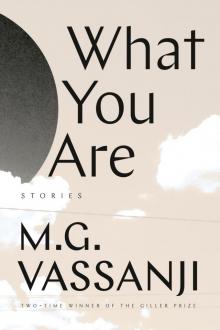 What You Are
What You Are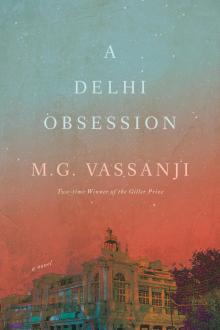 A Delhi Obsession
A Delhi Obsession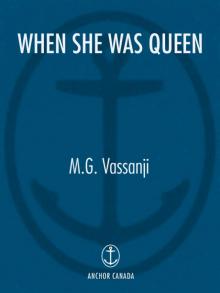 When She Was Queen
When She Was Queen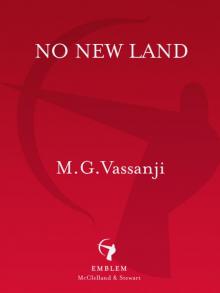 No New Land
No New Land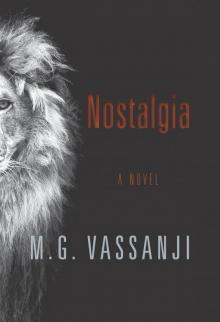 Nostalgia
Nostalgia Mordecai Richler
Mordecai Richler The Book of Secrets
The Book of Secrets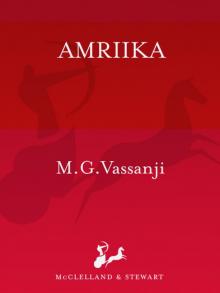 Amriika
Amriika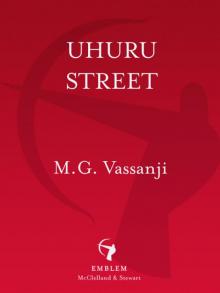 Uhuru Street
Uhuru Street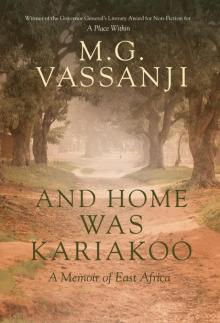 And Home Was Kariakoo
And Home Was Kariakoo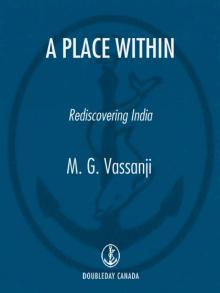 A Place Within
A Place Within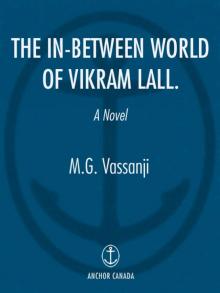 The In-Between World of Vikram Lall
The In-Between World of Vikram Lall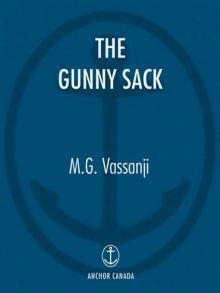 The Gunny Sack
The Gunny Sack